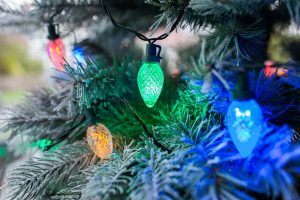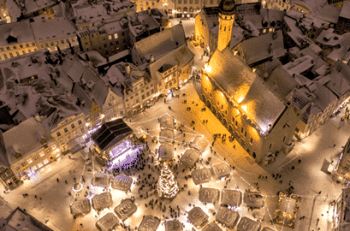A surprising number of Brits are taking dangerous risks with their Christmas trees that endanger their lives, one charity is warning.
 A survey by Electrical Safety First, a consumer protection charity, reveals that one in eight of those questioned say they buy a real Christmas tree but then cover it with hairspray to help prevent needles from falling off.
A survey by Electrical Safety First, a consumer protection charity, reveals that one in eight of those questioned say they buy a real Christmas tree but then cover it with hairspray to help prevent needles from falling off.
This is despite hairspray being a highly flammable liquid.
Also, one in three Brits confessed to decorating their tree with bauble tea-lights and in doing so are exposing the tree to a naked flame.
The survey also highlights that 19% of Londoners have Christmas tree lights with bulbs that are damaged or do not work – the highest proportion of any UK city.
Christmas tree lights
The Christmas tree lights being used in the UK are, on average, 3.5 years old.
Now the charity says the public should buy artificial trees rather than a real one because they are safer to have in our homes.
And while the evergreen conifers are likely to dry out while over the festive period, more than half of people questioned said they do not regularly water their Christmas tree.
And since these trees can absorb up to 1 litre of water every day means that millions of people could be putting themselves at risk when they neglect their tree.
The survey also highlights that one in eight people are looking to put Christmas lights on their real tree but say the lights are in a bad condition and one in four say their lights are either badly damaged, tangled or have frayed wires.
Lights on their Christmas trees

Another alarming statistic from Electrical Safety First shows that one in five of those who are putting lights on a real tree admit they will leave them on overnight when they go to bed and when they leave the house.
Indeed, an analysis by the charity highlights that there are more house fires occurring in December than in any other month.
A spokeswoman for the charity said: “The speed at which a real Christmas tree can burn means it’s advisable that consumers consider a break with tradition because if a fake tree catches fire you are more likely to have more time to get out.
“Whether your Christmas tree is fake or real, it’s important that you ensure the lights on or around it are in a good condition and are not plugged into a socket that’s overloaded.”
She added that trees should be placed away from heat sources including radiators and festive lights should never be left on when you go to bed or leave the house.
More information
Electrical Safety First publishes an electrical safety guide for Christmas, that includes top tips like not spraying your real tree needles with hairspray to stop them falling off (it makes the tree extremely flammable) and other top tips to ensure you have a happy, safe Christmas. Their guide is here: https://www.electricalsafetyfirst.org.uk/guidance/advice-for-you/christmas-tips/





